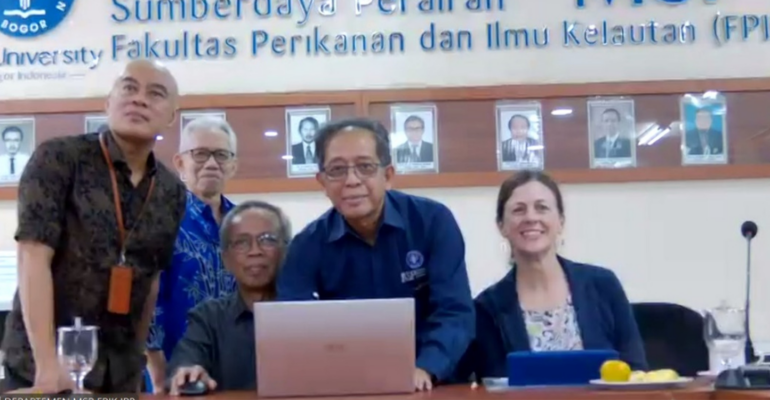Discussing Blue Carbon, NOAA USA visits the Department of MSP IPB University

The National Oceanic and Atmospheric Administration (NOAA) of the United States visited the Department of Aquatic Resource Management (MSP), Faculty of Fisheries and Marine Science (FPIK) IPB University. Ms Janine Harris, Marine Habitat Resource Specialist for NOAA was present to discuss about blue carbon to the academic community in the Department of MSP IPB University.
NOAA’s first visit to IPB University was facilitated by a Professor from the MSP Department, Prof Yusli Wardiatno as well as the Vice Dean of IPB University’s Graduate School for Academic, Student Affairs, and Alumni.
In her visit to the Department of MSP IPB University, Ms Janine Harris outlined NOAA’s scientific journey in working on research on blue carbon in the United States. She also reviewed the meaning and role of blue carbon from NOAA’s perspective.
“The mission of NOAA is to understand and predict changes in climate, weather, oceans, and coasts to share that knowledge and information with others, and to conserve and manage coastal and marine ecosystems and resources,” Ms Janine Harris explained.
In detail, she explained, there are six NOAA missions, namely 1) National Marine and Fisheries Services, 2) National Ocean Services, 3) National Environmental Satellite, Data, and Information Service, 4) Oceanic And Atmospheric Services, 5) National Seather Services, and 6) Office of Marine and Aviation Operations and NOAA Corps.
Furthermore, Ms Janine Harris also said that NOAA opens opportunities for researchers and students to utilise data from NOAA as a research topic. In addition, the possibility of collaboration between the MSP Department of IPB University and NOAA was also explored.
Of course, the MSP Department as the recipient of this NOAA guest told about the extent of the role of the institution and lecturers in working in the field of blue carbon and blue economy. Both fields have become very prominent environmental issues lately, not only at the global level but also in Indonesia.
‘In order to continue to be adaptive to current trends, the MSP Department has even made blue carbon the theme of the Freedom of Learning – Independence Campus (MBKM) thematic in 2023,’ said Prof Hefni Effendi, Chairman of the MSP Department at IPB University.
Furthermore, he elaborated, the 57th batch of MSP students had conducted independent research on blue carbon as an MBKM group assignment on Pramuka Island, Tidung Island, and the Mangrove Tourism Area in Brebes. Furthermore, in 2024, the MSP Department of IPB University launched the theme of blue economy as a thematic MBKM for MSP 58 students.
“This is a manifestation of the MSP Department as a higher education institution that is always adaptive to the latest trends in certain fields of science, so that we are always at the forefront of the science of aquatic resource management,” concluded Prof Hefni.
‘In addition to strengthening student competencies on blue carbon and blue economy, a number of MSP lecturers are also directly involved in task forces on blue carbon and blue economy both at the national and international levels,’ added Prof Luky Adrianto, Professor of the MSP Department and also as Chief of the International Research Institute on Maritime, Marine, and Fisheries (i-MAR) IPB University.
NOAA’s visit to IPB University was also implemented with a General Lecture held at the Ichsan Effendie Discussion Room of the MSP Department, IPB Dramaga Campus. This event was held in a hybrid manner, attended offline by S2 and S3 students from the Postgraduate Study Programmes of Aquatic Resource Management (SDP) and Coastal and Marine Resource Management (SPL). Hundreds of participants attended online from various agencies throughout Indonesia who are interested in blue carbon issues. (*/Rz) (IAAS/RUM)



